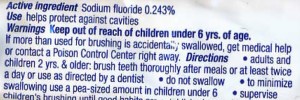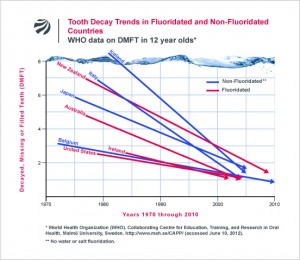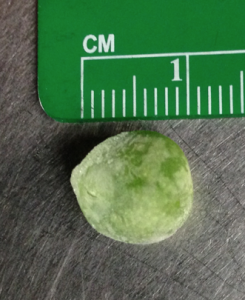Shouldn't the standard be higher to force a drug than to convince that it isn't needed?
Fluoridation hysteria rears its head whenever the topic of adding fluoride to the water supply is broached. It seems that a few people are rabidly against it, and about an equal number are rabidly in favor of it. Most folks seem to be in the middle, if they care at all.
Where the fluoridation controversy veers off into its own territory is that anti-fluoridationists are, almost instantly, labelled as whackos. It is true that in the early days of fluoridation talks, some of the most ardent opposition came from folks like the conservative group, the John Birch Society.
The anti-fluoridation folks have the moral high ground. They are simply saying, “Leave us alone.”
Now what’s really the deal with fluoride in our water?
Personally, I am opposed to the addition of fluoride into the public drinking water, but that has not always been so. For most of my life and through an undergraduate degree in biology, I accepted the party line that fluoridation was the best thing since “sliced white bread.”
It seems now however, that it would take a normal un-biased person about an hour to do sufficient research on the internet to conclude that, if you even own a toothbrush, fluoridation will have no benefit for you and that you don’t want your kids to drink it. And if you worry about breaking bones as you age, you probably shouldn’t either. The evidence looks to be overwhelming that there is far more potential for harm and very little evidence that it does any good at all for the vast majority of people.

Proctor & Gamble advises to seek medical help if you swallow more than a pea sized dollop of Crest. The same amount of fluoride contained in 3 glasses of Chicago tap water. (1.09 ppm = approx. 0.25 mgF/glass water)
I have provided fluoride-free water in my home ever since we have had a child in the house. A former research chemist, I have even done a fair amount of research in my home lab (see apparatus) to see if a more affordable (and better tasting) filtration method for fluoride than reverse osmosis was available. The answer is yes to better tasting, but no to more affordable.
Since I don’t have the time or resources to conduct mass epidemiological studies, what’s important to me in my investigation is to look at the proponents and the origins of the practice. Assuming that Myside Bias is at play, I am judging the authors and their motives as much or more than the actual conclusions of the studies. For example, when a CDC researcher says that he believes that the side effect of a 17% overall skeletal fluorosis rate is acceptable given the societal benefit, I judge that he is out of his league and no longer speaking as a scientist, but making a socio/political value judgment.
“I’d rather have a bottle in front of me than a frontal lobotomy.” –Dorothy Parker (attributed)
Here’s a punch list of the top reasons that have convinced me to want fluoride out of my water:
- Tooth decay has gone down in the rest of the civilized world at the same rate (or better) whether fluoridated or not.
- Supporters admit that it only helps prevent cavities in those who have virtually no dental hygiene.
- 41% of adolescents in the USA have symptoms of fluorosis.
- Even proponents admit that ingesting it is not as good as topical application.
- US Dept. of Health and Human Services and Centers for Disease Control lowered the acceptable limit from 1.2 ppm (parts per million) to 0.7 ppm just last year after decades of ridiculing those who said that 1.2 ppm was too high.
- American Society of Pediatric Dentists in 2006 said to NOT use fluoridated water for formula until the infant is 13 months old. This was slightly revised in 2013 after HHS lowered the acceptable levels to 0.7 ppm; now they just say to ask your doctor if you should use it. However many cities, like Chicago, are still adding over 1.0 ppm.
- Proctor & Gamble and other toothpaste manufacturers have scary disclaimers on their toothpaste instructions. They don’t really think that swallowing a toothpaste dollop, greater than the size of a pea, is worth a trip to the poison control center, do they? It seems like they’re hedging their bets against the next round of class action lawsuits.
In the years of my part-time research, I had occasion to attend several Water Quality Association annual conventions in Orlando, Las Vegas and Chicago. The exhibitors, particularly European ones, were uniformly dumbfounded that the US puts that stuff in the water. It is ironic that it is also one of the most difficult (read expensive) contaminants to filter, being the tiniest of the anionic halogens. Of the 350 million people in the world who have fluoridated water, 200 million live in the USA. Only 2% of the other 6.7 billion people worldwide have it added to their water. The interesting fact here is that the dental cavity rate in the first world nations is almost identical with or without fluoride.

Dental caries (cavities) lessened in first world nations about the same whether or not they used fluoridated water. The difference seems to be mean income, not fluoride.
Fluoride aside, the idea of entrusting the prescription of medicine and the dosage to politicians is not something I can endorse. The fluoride proponents counter by saying that fluoride has been ruled to not be a drug at the dosage put into water. This provides slim solace when it is noted that a judge in a court made that decision. Politically appointed judges differ, to me, scantly from politicians in their qualifications to prescribe drugs to my family.
If you don’t want to do a ton of research, this testimony from Dr. John Colquhoun, the former head of the New Zealand Dental board and former fluoridation advocate, is a pretty compelling argument – Why I Changed My Mind About Water Fluoridation. One more study by former advocates is also worthy of note – The Fluoride/Thyroid Connection. These people appear to have no “skin in the game,” to borrow a phrase from Warren Buffett. That is, they have no investment in opposing fluoridation, and have no profit motive to do so.
Would you allow your alderman to prescribe a drug to your child?
As a coda, I should note that, by contrast, I am totally in favor of water chlorination, that is, disinfection with the addition of various forms of the halogen chlorine.
The benefit provided by disinfecting water is real and beneficial to virtually everyone and the costs to remediate the small harm presented by the chlorine and chlorination by-products is affordable with simple technology. The small quantities of potentially harmful carcinogens that are formed with the reaction of chlorine and ordinary dirt and plant matter (humic acid) are relatively easy and cheap to remove. Costs for point of use filtration of the excess chlorine and the volatile organic compounds (VOC’s) are on the order of 2¢ to 4¢ per gallon compared to many times that for reverse osmosis or distillation to remove fluoride.
There will arise, no doubt, another disinfection technology that will make chlorination obsolete …ozonation maybe, or ultraviolet radiation? But each will have its own tradeoffs, and I would like to make that decision for myself, not leave it to my alderman.
Now please take a poll regarding fluoride.



5 comments for “Fluoride is medicine’s greatest success … or a mind control conspiracy.”